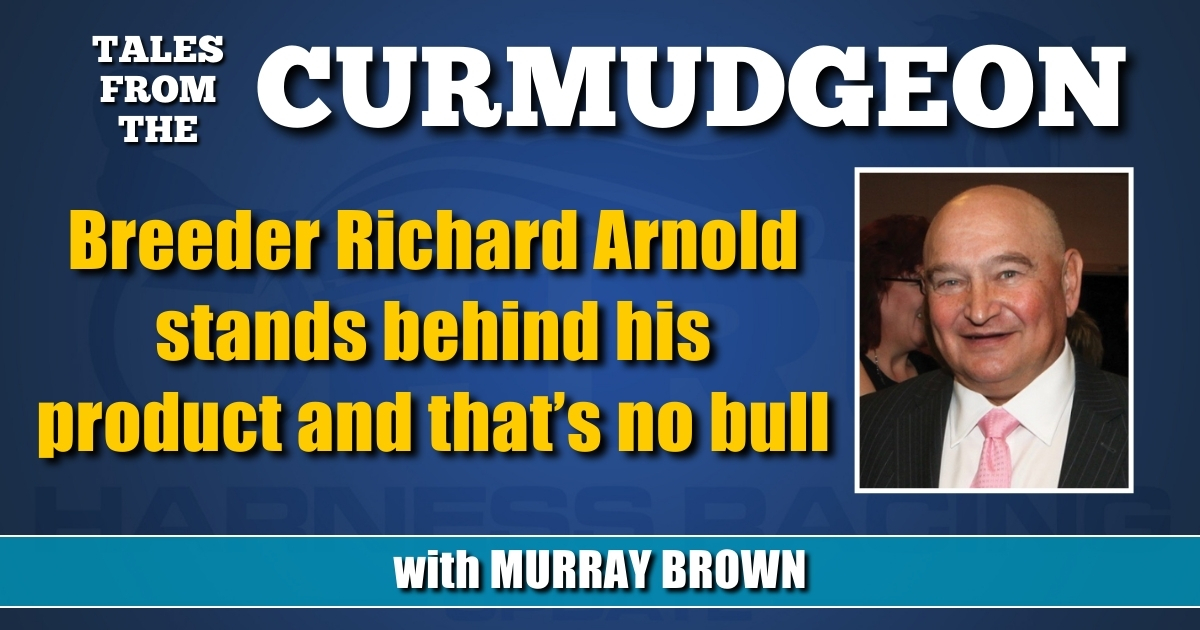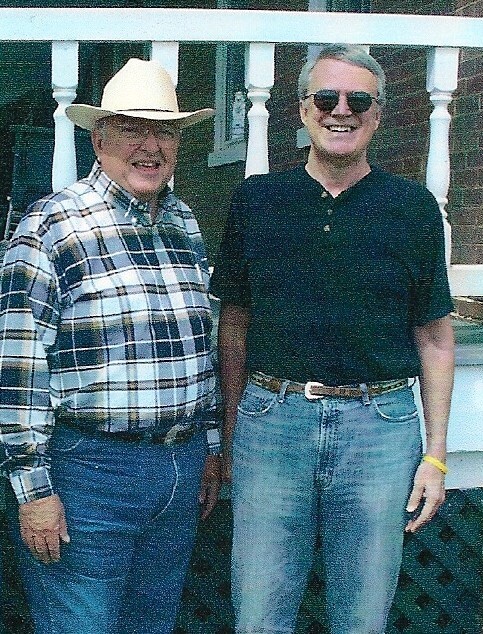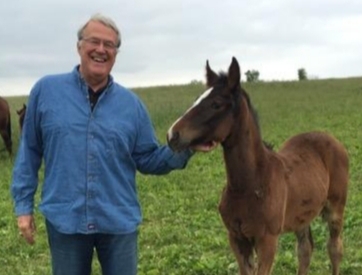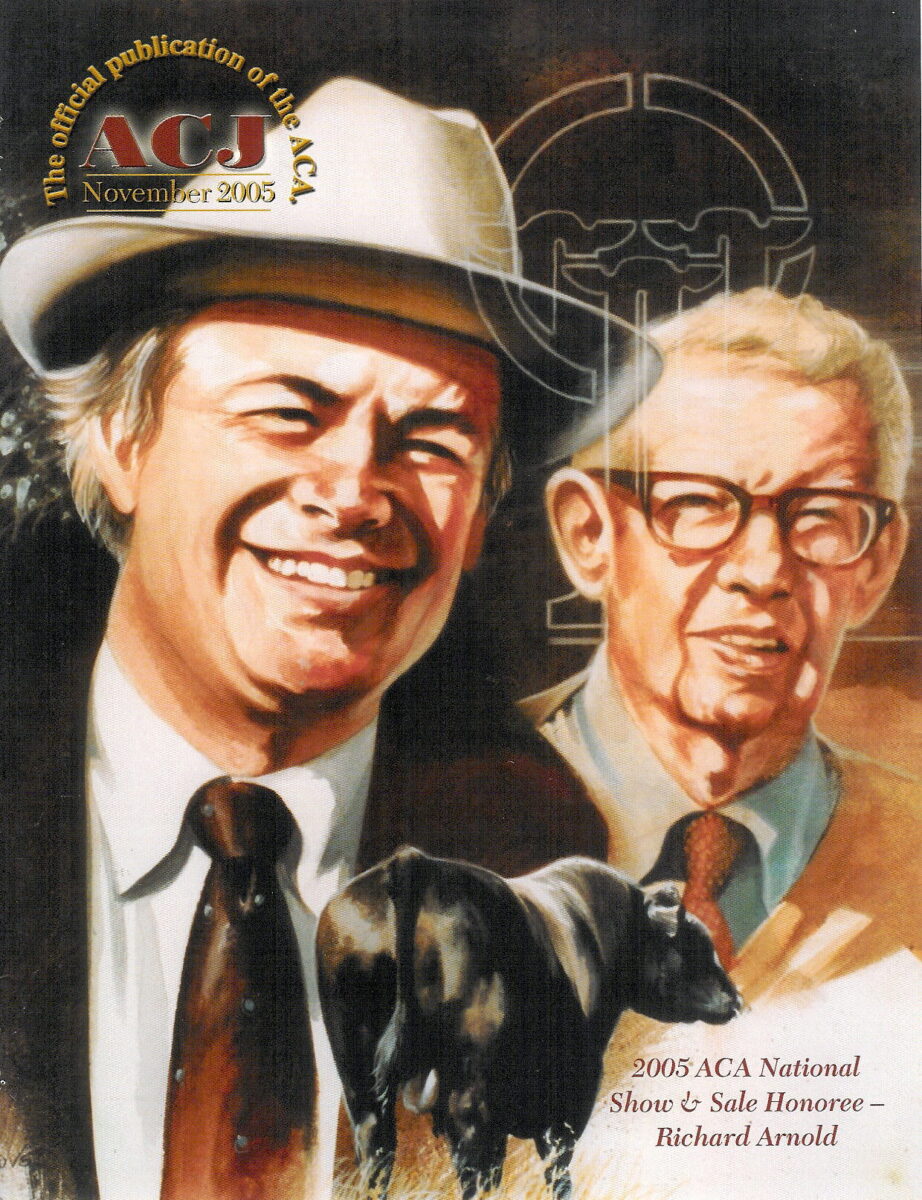Breeder Richard Arnold stands behind his product and that’s no bull
by Murray Brown
Richard Arnold and Bart Glass became good friends through a common interest in cattle, livestock genetics and Kentucky basketball. Willow Oak Ranch has historically run 400 cow/calf pairs and held an auction each year where some of their finest bulls were made available. Bart and Jane Glass were always found sitting in the front row of the event.
Eventually, their friendship led to Bart encouraging Arnold into expanding his highly successful and nationally-known cattle ranch into breeding harness racehorses. Arnold, a federal court trial lawyer, with offices in Miami, Washington D.C. and Austin, TX, agreed if Bart would teach him the ropes. Unfortunately, early in Arnold’s education fate tragically intervened – Bart passed away.
By that time, the Arnold and Glass families had become close friends and Arnold turned to Bart’s son, Jim, to help him find his way into our business. From that point, Arnold added horses, to cattle, genetics, law and basketball on his list of favorite subjects.
Arnold began his sojourn to the racehorse business by reading just about all that he could find on the sport and attending the occasional sale. He is, to quote my greatest teacher John F. Simpson, Sr., “a man who studies his lesson.” In 2010, he purchased his first mare Armbro Exquisite. She was to be the first member of a broodmare band that now numbers 26.
You are now deeply involved in the sport. How deep is your involvement?
“As you mentioned, we have 26 broodmares, 11 trotters and 15 pacers. We have 11 horses at the track. We regard the breeding of these horses as a critical part of our ranch business. The great thing about this business is it is loaded with data and historical information and it combines two fascinating subjects: livestock genetics and athletics. We were initially only interested in breeding and selling yearlings but it became pretty clear that breeding the right animals requires a detailed understanding of their function. So, as we studied this, we concluded we needed to be invested in racing to have a complete picture. Just as we did in the cattle business, we concentrated on confirmation and maternal families.
“We try to build our broodmare band out of attractive athletic correctly conformed mares out of the best bloodlines we have an opportunity to obtain. As one of my favorite basketball coaches used to say, ‘The only thing that matters is everything.’ And I believe that applies to all competitive endeavors.”
You both breed and race. Do you consider yourself to be primarily a market breeder?
“The answer to that is a qualified yes. Our goal is to offer all of our yearlings at public auction. There are sometimes exceptions to that rule. For example, this year we are retaining three trotting fillies who will ultimately become members of our broodmare band. The main reason for that is the extremely high prices high quality trotting bloodstock is bringing when it is available. My feeling is that it is far too difficult to acquire high-quality trotting bloodstock at reasonable prices.
“In all our business endeavors, I am a firm believer in standing behind our product, so much so that if anybody that buys one of our yearlings wants us in for a piece of it after its purchase, we are game. It is a policy that has served us well in the cattle business. You need to believe in what you sell. When someone buys one of our bulls and is dissatisfied with their purchase, we will take it back and replace it with one that pleased the buyer.”
Do you have some horses in training?
“Indeed, we do. Presently, we have horses in training with Tony Alagna [three], Julie Miller [three], Gregg McNair [one] and Virgil Morgan, Jr. [two]. These are horses we bred and raised here on the farm many of whom are out of homebred mares. We have partners on some of the colts which is our preference for any colts we market. There is great pleasure watching them train and, hopefully, watching them win in Grand Circuit participation. There is great satisfaction to be found in following those to which you still retain a bond, even though you don’t own them anymore.”
How do you go about planning your matings?
“We believe in the importance of conformation. Every mare that becomes a member of our broodmare band is a very correct individual. The same applies to stallions. We only breed to a stallion that either I or Jim Glass have seen in person and passes the ‘wow’ test. It goes without saying that these stallions must have been top performers on the racetrack. Today’s greatest performers, almost without exception, are also great individuals. This was not always the case. But it appears to be so today. We own shares in many of the top commercial stallions around. They include the trotters Gimpanzee, Father Patrick, Muscle Hill, Muscle Mass and Temporal Hanover. We also owned shares in Bar Hopping and Cantab Hall before their demise. Among pacers, we own shares in Bulldog Hanover, Captaintreacherous, Cattlewash, Confederate, Sweet Lou, Tall Dark Stranger and Well Said. All of these horses possess all the attributes that you would be looking for in a stallion, but not all of them will become what is accepted as being successful. That is the number one puzzle that a breeder faces. As my friend, Myron Bell, says, ‘It takes knowledge and judgment to breed a good horse but it takes all of that plus luck to breed a great one.’”
Are there any special methods employed in raising your yearlings?
“The answer would be to employ nature at its best. We raise them with plenty of room, great terrain and in groups; how nature intended them to be raised. Willow Oak Ranch, here in Rogersville, TN, encompasses 1,500 acres, 200 of which is devoted to horses and the rest to cattle. The horses have plenty of room on which to run and play. We feed them the best grain and hay available. The pastures are deep in necessary nutrients. We have the same lime rock-based pastures they have in Central Kentucky.
“They are looked after in the best manner that we know how. Because we are relatively small, we try to make what could be a disadvantage, an advantage. With 19 foals, we are able to closely manage the babies and yearlings in a manner that is more difficult in large numbers. The horse is a herd animal; we raise them in groups of the same sex where they can play and even fight. They usually develop a pecking order where one becomes the boss. We rotate groups to give every foal a chance.
“There are some who believe that this might carry over to the racetrack where the boss in the field becomes the best on the track. I haven’t as yet raised enough horses to have a firm opinion on this. We have 39 stalls for horses on the farm. They are all quite large, with the stalls for mares and foals being somewhat larger in size. Unless harsh weather dictates otherwise, they spend the vast majority of their lives outdoors. We are very fortunate in that the climate in this area is fairly mild and is quite conducive to raising livestock.”
Now, may be the most important question. You are an avid sports fan, most specifically a follower and lover of basketball. The NBA finals started on Thursday. Who do you like?
“That may be the most difficult question you’ve asked me. Talent wise, the Celtics are loaded. They may have a strong balanced team, especially if [Kristaps] Porzingis is available to play as now appears to be the case. They were the best team throughout the season. Nevertheless, their one weakness might be an over tendency to shoot the three, too many of which are off the dribble.
“If it isn’t dropping, then who knows? The Mavericks are on a roll. They might have the best backcourt currently with [Kyrie] Irving and [Luka] Doncic. They are both playing remarkably well and are great finishers. The team also has a great deal of momentum.
“Insofar as comparing rosters, the Celtics probably have an edge. But just like in horse racing, the best horse does not always win, in the same manner, that also applies to sporting events with regard to the best team. My pick to win it all is Dallas. But Boston is way overdue. As I tell my friends in Boston, welcome to the 21st Century. As a Heat season ticket holder, I remind them, in this century, Miami has been Eastern Conference Champion seven times with three O’Brien trophies and Boston is three and one. Like I said, Boston is overdue.”



















